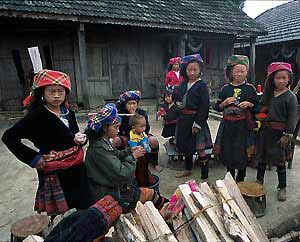Laos: The Visit To The U.S and the Hmong People
Tuesday, July 13, 2010

This coming week, Thongloun Sisoulith (pictured left above) will be visiting Washington D.C as the deputy Prime Minister and Foreign Minister of Laos making his visit one of the first from the Southeastern Asian country since the Cold War era.
Laos and the United States have had rocky relationships after the Vietnam War. The Cold War conflict between the U.S and Minh’s communist troops had spread to parts of Laos when the U.S began funding an ethnic group called the Hmong to form resistance against communist forces. The Laotian government will be sending their delegation to the U.S in response to the Secretary of State inviting Laotian officials to the U.S.
This week, Al Franken, a U.S senator visited Laos primarily to see what conditions the Hmong people were in. Back in the ’70′s, the Hmong people were trained by the Central Intelligence Agency in order to fight against Pathet Lao, a communist statesman who took over the government in Laos. Consequently, the Pathet-government targeted numerous Hmong people in retribution. Retribution often was comprised of introductions to “re-education” camps and slave labor.

The Laotian government of course was embittered by further Hmong resistance which was secretly supported by the U.S government. Since then, tens of thousands have tried to escape from their ancestral homes to Western and neighboring nations. Relationships between Laos and the United States took a turn when the Clinton administration admitted to supporting the Secret War in Laos in 1997.
However this did not warm the relationship between the Laotian-communist government and the Hmong people.
Recently, more than 4,500 Hmong were deported from Thailand last year as the Thai government ruled that the Hmong were not political refugees in contrary to some of the nations’ stance on the Hmong people being political refugees.
Senator Franken reported that the Hmong people he visited seemed to be “in fine condition” but also said that the Laotian government said the ‘refugees’ Franken visited wanted to stay in Laos despite invitations of resettlement from the Canadian, Dutch, American, and Australian governments; very peculiar considering their fear of reprisals and their many relatives and ancestors had fled from Laos or hid among the mountains.

Senator Al Franken
Senator Franken stated that he will “request” that Secretary Clinton try to strike up a deal with the coming Laotian officials to release 158 Hmong refugees.
Unlike the 4,000 Hmong controversially repatriated from Thailand last December, the United Nations actually had the time to determine these 158 individuals were political refugees.
Source


0 hlub:
Post a Comment